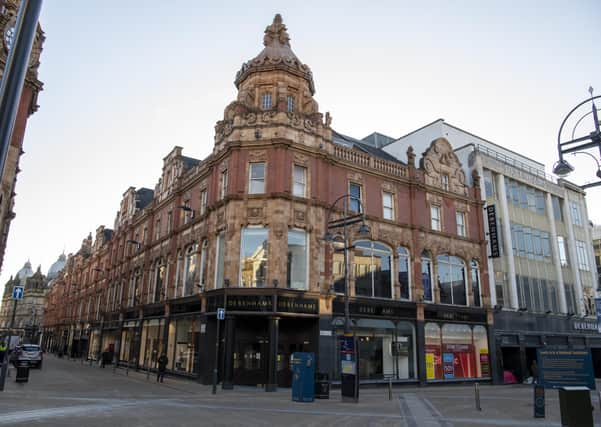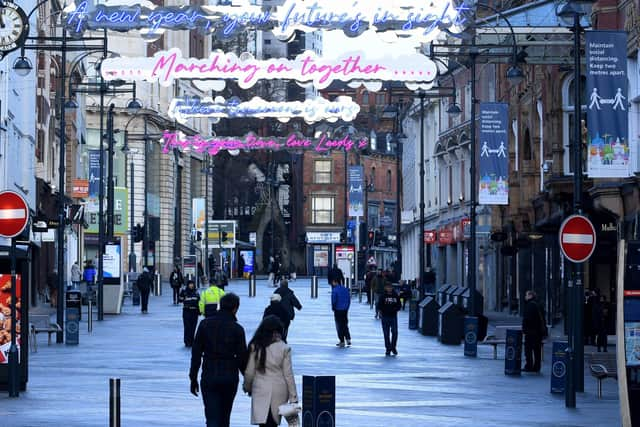Tax online giants to save our high streets – Andrew Vine


Debenhams, Burtons, Topshop, Oasis and Wallis are amongst them, names familiar to generations of shoppers who, like myself, probably imagined that they would always be around.
But then only a few years ago it seemed unthinkable that Woolworths, BHS and Mothercare would vanish, until they did.
Advertisement
Hide AdAdvertisement
Hide AdThe names of the latest round of retail casualties of the pandemic will live on, but only as ghostly online presences, having been snapped up by internet giants like Asos and Boohoo in deals which, at a stroke, have taken a huge bite out of our shopping streets.


And in doing so, the online retailers have put thousands out of work, condemning them to join the desperate scramble to find new jobs in the most daunting of times.
Unemployed shop staff are victims of woeful failures of management, of businesses being overloaded with debt, like Debenhams, or undermined by a miserly lack of investment, such as Burtons and Topshop.
Those who ran them either failed to appreciate – or chose to ignore – the threat of online rivals. And the depressing result of this is that our high streets are turning into wastelands, and doing something about that must be one of the most pressing tasks for the Government as it plots Britain’s economic recovery.
Advertisement
Hide AdAdvertisement
Hide AdEven before the pandemic, the scale of shop closures was disturbing, the ever-increasing number of empty premises disfiguring streets and creating a creeping sense of dereliction.


That has accelerated alarmingly, as lockdowns have left shoppers with no alternative but to go online. No footfall means no future.
No responsible Government can countenance town and city centres sinking into scruffiness. It can’t abdicate responsibility and tell local authorities that it is their problem when councils barely have the resources to provide essential services.
There must be a national recovery plan for high streets, just as there will have to be for other sectors of the economy stricken by the effects of Covid-19.
Advertisement
Hide AdAdvertisement
Hide AdThe tens of thousands of jobs lost in shops cannot simply be written off. If shopping streets are revitalised, they will create new work for people.
The fightback should start with a levelling-up of the playing field between online retailers and shops, and that means a new tax regime which forces big players to pay their fair share.
Lockdown has been boom time for online giants such as Amazon, whose UK sales rose by 51 per cent in 2020 to £19.4bn, which is about double the takings of Marks & Spencer in the same period.
Yet the previous year, the company paid only £239m in tax. It has long been apparent that the big online players are not paying anything like as much as they should.
Advertisement
Hide AdAdvertisement
Hide AdWhilst complying with the law, their complicated structures and movement of revenues through low-tax countries including Luxembourg is short-changing the Inland Revenue, and by extension the very customers who enrich them.
Chancellor Rishi Sunak last week floated the idea of an online sales tax, which is welcome, but he needs to go farther and find some way of cutting through opaque corporate structures to compel companies to pay what they owe in tax, just as every employee in the land has to through the PAYE system.
These companies are making vast profits from British taxpayers whilst, at the same time, taking them for fools, and it’s got to stop. If the Government can get to grips with this and compel the likes of Amazon, Facebook and Google to pay a fair amount of tax, it should demonstrate a commitment to revitalising town and city centres by ring-fencing the proceeds to be spent on reviving high streets.
That will mean working with councils – and giving them money – to encourage new retailers to open and those still in business a fighting chance of surviving against online competition.
Advertisement
Hide AdAdvertisement
Hide AdCutting business rates would be a lifeline, and so would providing backing for empty shops to be brought back into use, possibly as community hubs or arts spaces which would attract people back to high streets where they would hopefully start spending money again.
It’s going to take imagination as well as investment to revive shopping centres. Just up the road from Yorkshire, Stockton-on-Tees has come up with a brilliant plan to turn its town centre into an urban riverside park, where shops will be shoulder-to-shoulder with people exercising and attending events, to the benefit of all.
That’s the sort of innovative thinking our town and city centres need if they are to recover. Now it’s up to the Government to rake in enough taxes from the online giants to make it happen.
Support The Yorkshire Post and become a subscriber today. Your subscription will help us to continue to bring quality news to the people of Yorkshire. In return, you’ll see fewer ads on site, get free access to our app and receive exclusive members-only offers. Click here to subscribe.
Comment Guidelines
National World encourages reader discussion on our stories. User feedback, insights and back-and-forth exchanges add a rich layer of context to reporting. Please review our Community Guidelines before commenting.